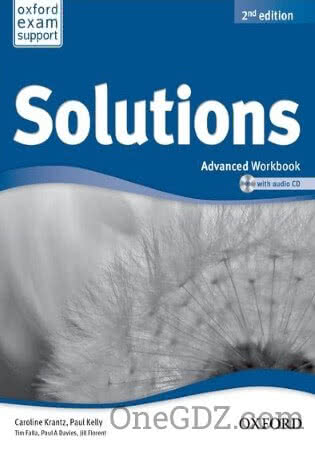
ГДЗ Solutions Advanced Workbook (2nd edition) answer key
Додаток
Get ready for your exam 3 page 55–56
• Reading: Elicit strategies for dealing with the matching task. Encourage students to underline the parts of the text that may help them to answer. Point out that some of the questions are more easily answered by elimination.
• Use of English: Encourage students to look at the whole sentence and decide what part of speech (noun, verb, adjective, adverb) is required. Point out that sometimes they should use a negative prefix. Remind them to make sure that their answer matches the grammar and sense of the whole sentence.
• Listening: Janusz Korczak (1877–1942) was a Polish children’s author and educationalist. He studied medicine at university and became a paediatrician, before becoming director of an orphanage in Warsaw. He ran the orphanage along very democratic lines, with the children taking part in a parliament and running a court there. He always championed the rights of children, believing that parents and other adults should help children to achieve their own goals, rather than imposing goals on them. As well as being a popular author of children’s story books, he wrote about pedagogy and the philosophy of education. One of his most famous books was How to Love a Child. Much of his work has been translated into other languages. The United Nations’ Convention on the Rights of the Child was inspired by his teachings. Much of his work has been translated into other languages.
• Remind the students to prepare for the listening by reading the sentences carefully and underlining any key words. Point out they are supposed to listen for the general sense of each utterance rather than for details or words. Play the recording twice.
• Writing: Read through and discuss the tasks together. Students plan a story or letter to be written at home or in class.
• Speaking: Elicit strategies for the task from the students. Remind them to talk about each picture, comparing / contrasting them rather than just describing them. If necessary, in a weaker class, brainstorm ideas about both pictures before starting. Students work in pairs to do the task.
• Reading: 1 B, 2 D, 3 B, 4 A, 5 C, 6 B, 7 C, 8 A
• Use of English: 1 reinforcements, 2 immemorial, 3 deprivation, 4 losing, 5 heritage, 6 untold
• Listening: 1 E, 2 A, 3 D, 4 B
Transcript WB 14
Speaker 1 Children’s rights are one of the most pressing issues in today’s world. There’s so much injustice around! And I’ve made it my personal mission to bring the work of Janusz Korczak to the attention of all those who influence children’s lives in any way. Did you know that the Convention on the Rights of the Child passed by the United Nations in 1989 was inspired by his teachings? It took us over 50 years to hammer out the ‘rights’ that Korczak had already laid out in his books decades ago. His books entitled How to Love a Child and Respect for the Child prove that he was not only ahead of his own, but also of our times! I mean, Korczak’s insights and simple truths concerning children are as fresh and valuable today as they were then. If only more parents, teachers, counsellors and juvenile court judges would listen.
Speaker 2 In his orphanage, Korczak had a Children’s Court, which was presided over by child judges. Every child with a grievance had the right to bring the offender to the court of his peers. Teachers and children were equal before the Court and even Korczak had to submit to its judgement. He envisaged that in 50 years every school would have such a court and that they would be a real source of emancipation for children, teaching them respect for the law and individual rights. I must say that the idea seems a bit utopian to me. I’ve been a teacher for fifteen years now and I’m a firm believer in the equality of students and teachers. Yet having children make binding decisions on important matters is like saying they’re mature and experienced enough to make such decisions. I’m afraid that is a bit of a far-fetched notion.
Speaker 3 There was this radio thing about Korczak recently and we listened to that – the guys from the school council and I. So he had this idea about peer courts at school and we just couldn’t believe it. I mean there’s no school that wouldn’t benefit from a court like that. If students could judge one another and take responsibility into their own hands, then we could do something about things like bullying and theft at school. I mean who knows better than the students who does what and which punishment would really work? And most of all – it would make teachers listen and respect our opinions and feelings. I wish our school would allow us something like that.
Speaker 4 We were all surprised at Korczak’s instruction to gather in the X-ray lab. The doctor arrived, bringing along a four-year-old from his orphanage. The X-ray machine was switched on and we saw the boy’s heart beating wildly. He was so frightened by the strange people, the dark room and the machine. Speaking softly, Korczak told us: ‘Don’t ever forget this sight. How wildly a child’s heart beats when he is frightened. It does even more so when the child reacts to an adult’s anger, not to mention the fear of punishment.’ Then, heading for the door with the boy’s hand in his, he added, ‘That is all for today!’ That lesson was imprinted on our minds forever.